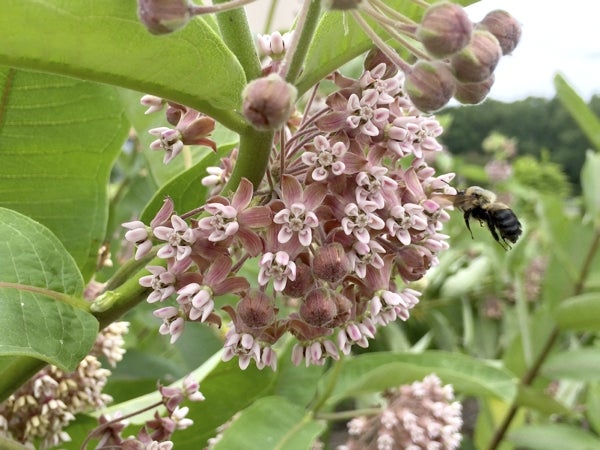Q&A: Mold on mulch, milkweed and more
Published 12:00 am Friday, June 10, 2016

- Cooperative Extension Milkweed attracts bees and butterflies, but it can be invasive in a yard.
Eww, what is this on my mulch? When is the Wednesday Market going to open? What is this smelly weed in my garden? Those are questions in a typical week in the daily life of an Extension Agent.
I had to attend a training the other day, and I came back to the office to find five plant/insect/disease samples, 20 emails and about five missed calls. It is gardening season. Here are some answers to many of your questions:
Answer: This is the infamous dog vomit mold, also known as slime mold. I was pretty surprised to see a specimen in our area so late in the year, but sometimes these things happen. I will attribute it to the weather we have had lately. This mold likes cool, shaded areas, so if you have an environment with mulch or rotting logs, you may see slime mold in your area. They do not harm your plants, but it is definitely a conversation topic with gardeners when it pops up in their flower beds. For more information, visit this website: http://www.clemson.edu/extension/hgic/pests/plant_problems/hgic2354.html
Question: When does the new Wednesday Farmers’ Market open, and where is it?
Answer: The Wednesday morning and new afternoon market has been open for a few weeks now. The morning market is still from 8 a.m.–noon at the same location, across the street from Rowan Public Library in Salisbury. The only thing that has changed is the evening Wednesday market; it is from 4-7 p.m., right beside the New Sarum Brewing Company at 111 N. Lee St. It is easier than ever to pick up your sweet corn, bouquets and locally raised meats at farmers’ markets. There are lots of activities, cooking demos and youth programs that will be hosted at all of the locations throughout the summer. Take a look at their Facebook page, or visit their website for more details at: http://salisburyfarmersmark et.com/
Question: When is the Herb Gardening DIY (Do-it-Yourself) class?
Answer: It will be on Saturday, July 30 from 9:30–11:30 a.m. This is a small adjustment in time, so please make sure you RSVP and change your calendars. Call 704-216-8970 for more details and to RSVP.
Question: I really like the smell of this weed but it is still a weed, and I am not sure if I want to kill it or keep it. First of all, what is it?
Answer: This is common milkweed or Asclepius syriaca. Sometimes, the plants can be seen on side banks and ditches but with more urban encroachment, these wild areas have dwindled. Pollinators enjoy this milkweed, and I even have a photo of a bee congregating on the blooms. The flowers smell divine and the seed pods are strangely shaped, becoming dry later in the season and opening to allow the seeds that are attached to silken threads to disperse in the wind. The common milkweed can be invasive so limiting its areas may be best, especially if it is trying to get into your gardens. Milkweed is important to the monarch butterfly population, and choosing the right milkweed is imperative if you want to provide a habitat for this endangered butterfly. The non-native varieties are not the best for the monarchs; however, there are a few with similar coloration that are just as great such as Asclepius incarnate (Swamp Milkweed) and Asclepius tuberosa (Butterfly Weed).
If you would like to learn more about slime mold, local farmers’ markets, planting for pollinators, or to RSVP for the DIY Gardening Series, call your local Cooperative Extension agent, Danelle Cutting, at 704-216-8970.




